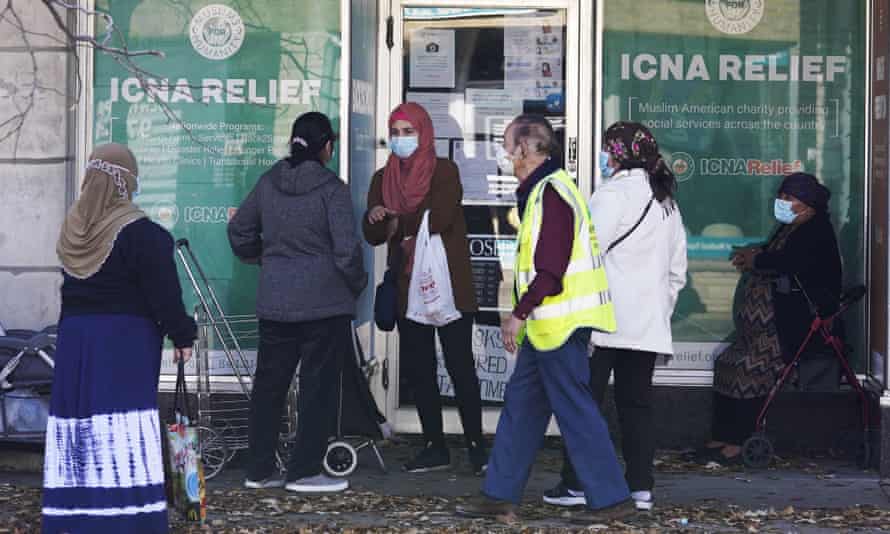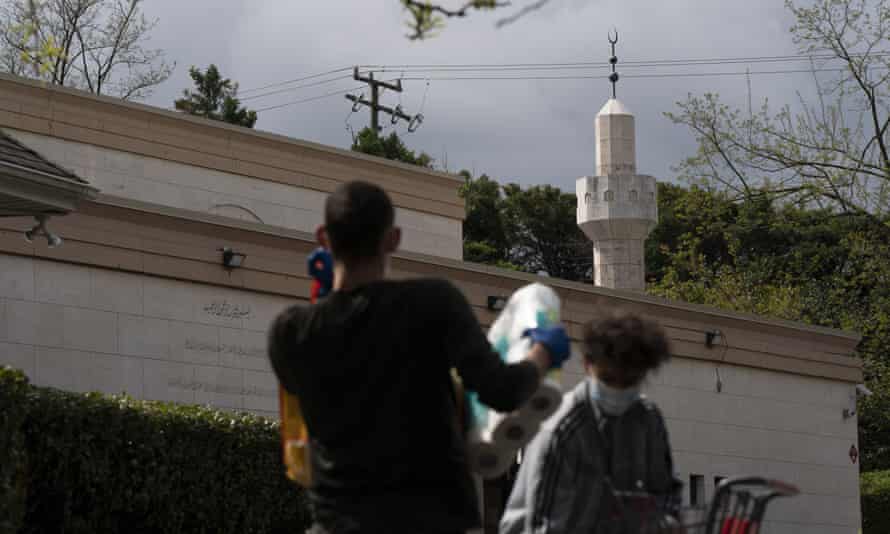The building facade is deteriorating. The heating system is a fire hazard. When it rains outside, it also rains inside – a plastic container near the prayer area collects water. Masjid An-Noor, a mosque serving the Muslim community of Bridgeport, Connecticut, for over 30 years, is barely holding on – and it is part of a trend of mosques across America facing dire financial problems during the Covid-19 pandemic.
In April last year, as states across America went into lockdown, the Muslim holy month of Ramadan was just beginning. The holy month is a time when mosques open their doors each night, welcoming members and guests for iftar – a communal meal to break the day’s fast. It’s also one of the most fruitful times of year for fundraising, particularly for local mosques, which cover the majority of expenses through individual donations.
But as in-person worship was put on hold, congregants could no longer share their nightly meal. And throughout the rest of 2020, families were barred from going to Friday prayers, or Jum’ah, another robust time for fundraising. And with unemployment rising, many Muslims families faced their own financial hardship. As a result, donations to mosques across the country declined dramatically – for some places of worship, annual funding fell by 40-60%.
Larger, regional mosques in the US, usually based in urban areas, are connected to large Muslim communities and a network of other mosques that provides financial security. Smaller neighborhood mosques, sometimes called mahallah mosques, in cities and suburban and rural areas, lack the same safety net. There is also little financial support offered by federal and state governments and many of them turn to GoFundMe efforts to survive – with mixed results.
“We are extremely in financial debt, we owe a lot of money to people,” said Atif Seyal, an executive committee member of the mosque in Connecticut, who helped organize a GoFundMe fundraiser for the mosque, which sought to raise $100,000 but has so far accrued only $12,200.
“We have a lot of children in the community and we want to teach them our religion,” said Seyal, explaining why it was important to him that the mosque continues to exist. The mosque also provides a service to people in the town of all ages, supporting “people in need, people who don’t have a job. When a family member passes we help them to get them buried in the proper way.”
According to Tariq Reqhman, the secretary general of the Islamic Circle of North America, a non-profit in Queens, New York, “99% of mosques in New York City have community support, and do not have grants or public or government funding. Everything comes from the community.”

The situation got so dire in the city that Mosaab Sadeia at the Islamic Leadership Council of New York set up a grant for struggling mosques. “They’re defaulting on bills, rent not being able to be paid, it turned bad at some point ,” he said. But “Covid hits everyone, not just mosques, and people weren’t able to give as much to the grant.” Ten mosques applied and they could only offer financial assistance to one in the Bronx.
“Ninety-five per cent of small mosques do rely on crowdfunding as their largest source of funding, and they don’t have big financial backers to keep them afloat and keep everything going,” he said. And because Muslim civil society in the US is not developed to the same level as that of the Catholic church, for example, they can only do so much, he said.
A neighborhood mosque in Westmont, Illinois, which has capacity to fit up to 150 people, was on the brink of closing. When it was established in 2016, the mosque struggled financially, but was able to cover its expenses through the support of family and friends in the community.
Over the past year, though, as they faced major repair costs on top of rent and utility bills and the salary of the imam, they were running out of options. They started an online fundraising campaign for the first time in November.
Through the support of the Mecca Center, another mosque in the area, and community members they were able to raise almost $50,000. When the other mosques started reaching out on their behalf, that’s when a lot of donations came through, said one board member who wished to remain anonymous. Enough to keep the mosque open. “It was very difficult, though,” he said. “I tried to figure out ways to, you know, get around it, sell my car or things like that, but with God’s grace and people’s support, it really helped a lot.”
The fate of a mosque run by the Islamic Center of Eastern Shore in Georgetown, Delaware, may not be as lucky. The American Turkish Friendship Association (ATFA) owns the building where members worship on Lewes Georgetown Highway. Due to a depletion of funding during the pandemic, ATFA could no longer make their mortgage payments and were forced to put the building up for sale.

To purchase the property, the mosque needs more than $320,000. “Now, brothers and sisters, we need your help more than ever to make our effort of saving this mosque a reality. Please donate generously and spread the word,” the GoFundMe states. Despite months of fundraising though, the appeal is still short of the money required to both buy the property and make the necessary repairs – having raised only $44,134 of the $320,000 needed to ensure the mosque’s future.
Another neighborhood mosque, Mountain View – Palo Alto Musalla, while based in an affluent area of northern California, serves a mostly working-class Muslim community and also faces major funding shortfalls. “Because all the mosques were closed, we were just doing online fundraising and it was less than half of what we had raised the year before,” said the mosque’s president, Farha Andrabi.
The musalla provides value to the community, offering a more intimate, personal experience, and Andrabi says it’s important that neighborhood mosques survive.
“I think because of the sheer size, something that gets lost in mega churches and mega mosques, is that you actually know each other, you’re connected to each other’s lives and you really have a feeling of an extended family … So you’re meeting the same people, the kids are going to similar schools … your needs, your activities and everything is connected. It gives a sense of security and support, which is very important for mental health,” she said.
With Ramadan starting again this month, mosques are open, but operating at only 20-30% capacity. Andrabi hopes still for a return to normalcy soon. “We will just be relying on the goodwill and sincerity of the community members,” she said, in the absence of wealthy donors, institutional support or government assistance. “Although with the fourth wave coming and with variants coming,” she said, “you really wonder … when real normal would be a possibility?”
This content first appear on the guardian
